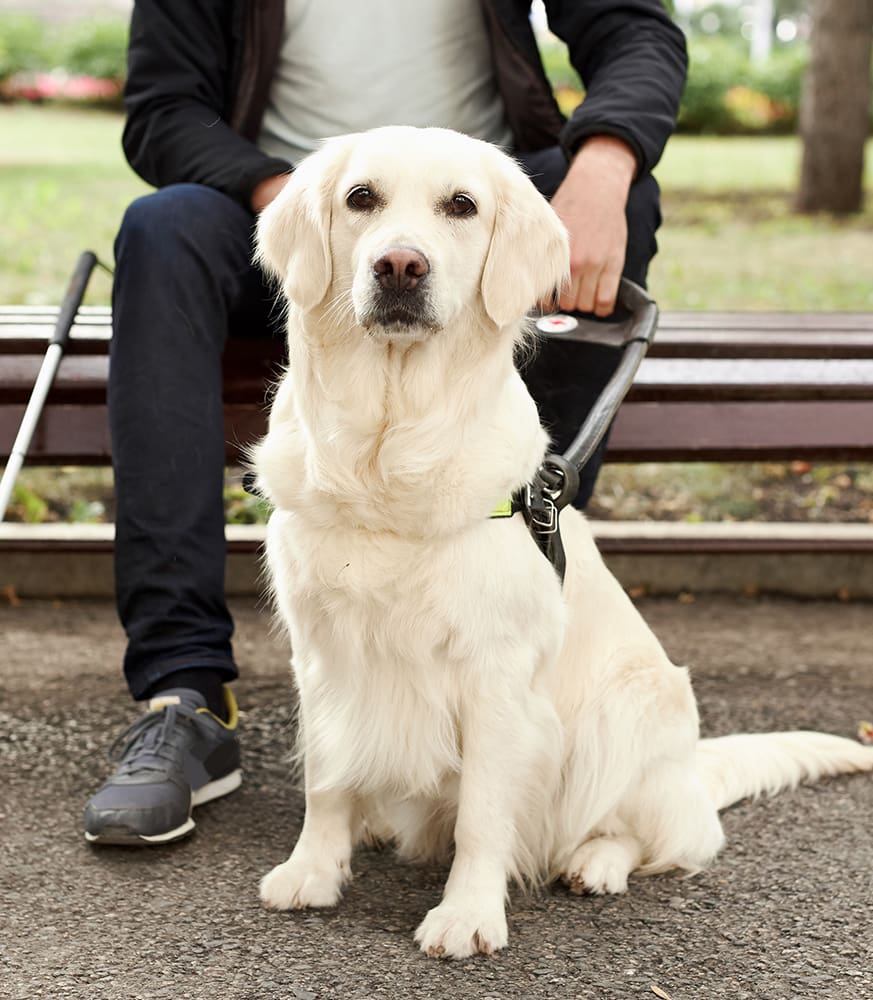Top rated service on:






![]()
![]()
What Is An Emotional Support Animal?
An emotional support animal (ESA) is any animal that is prescribed to a person with a mental or emotional disability as a part of their treatment plan. They must be prescribed by a licensed mental health worker or doctor in the handler’s state, and they must be prescribed through a valid ESA prescription letter. Since they are deemed medically necessary, an ESA must be allowed to live with their handler in almost any long-term rental regardless of no-pet policies (including most college dorms), cannot be charged pet rent or deposits, and are exempt from breed, size, or weight restrictions.
An ESA can be any animal that can be reasonably cared for in a person’s home, including a dog, cat, reptile, rodent, small mammal, bird, or fish. Unlike a service animal, an ESA does not need to undergo training to perform specific tasks; instead, they help their handler by offering support purely through their companionship. An ESA can also help a person develop a healthier daily routine.


Our Easy Emotional Support Animal Process


3 Minute ESA Pre-Assessment
Answer a few questions to find out if you’re good candidate for an ESA.


Speak with a therapist
We’ll pair you with a licensed therapist in your state.


Receive your ESA Housing Letter
Receive your ESA letter via email within 24 hours* of being approved.
*For Arkansas, California, Iowa, Louisiana and Montana residents, new laws require those seeking an ESA letter to establish a client-provider relationship with the individual for at least 30 days prior to providing documentation. As a result, we require two consultations and you will not receive your ESA letter until day 30.


Our Simple Service Dog Process


Register Your Dog & Add PSD Training
Submit your owner and dog info and add our online psychiatric service dog training course to your order.


Complete PSD Training Course
Train your dog to be a psychiatric service dog in as little as 4 weeks.


Receive Service Dog Certificate Of Completion
Once your dog passes the public access test, you will be issued a certificate of completion and you can take your dog nearly anywhere you go.


Why EmotionalSupportAnimal.com Is The Best ESA Letter Website
We are deeply committed to making legitimate ESA letters accessible to all who qualify. Our ESA letter process is simple, transparent, and legally valid in all 50 states and our large nationwide network of trusted mental health professionals allows for the fastest possible turnaround time.
All customers have access to our world class legal support team and are protected by our 100% money back guarantee if their ESA letter isn’t accepted for any reason. Rest easy, we’ve got your back!
| Service Provider | Money Back Guarantee |
Legal Support | Live Consultations | Phone/Email/Chat Customer Support |
|---|---|---|---|---|
  |
||||
  |
||||
  |
||||
  |








Our Nationwide Network of Licensed Mental Health Providers
Finding a licensed mental health provider in your state is essential to receiving an ESA prescription letter, as well as to making sure you qualify for a service dog. Our nationwide team of friendly, knowledgeable, and qualified mental health professionals makes finding your perfect match simple and stress-free.
We’ve partnered with empathetic mental health professionals in every state, so that you can receive the care and support you need without having to deal with waiting lists, searching for a professional yourself, or worrying if a practitioner is legitimate or legally qualified. Our team is meticulously vetted and ready to help you.


Professional Dog Trainers to Help You Train Your Service Dog
To be considered legally valid, a service dog must be trained to perform at least one task that mitigates the symptoms of a diagnosed disability. Our team of American Kennel Club-certified professional trainers is available to help answer questions, provide video training sessions, or work with you in person to help train your service dog.
We carefully vet our trainers to ensure every member of our team is knowledgeable, experienced, and passionate about training service dogs. Plus, we only work with trainers who exclusively use positive, reward-based training methods, which are both highly effective and help to build a stronger bond of loyalty, trust, and love between you and your service dog.


What Our Customers Are Saying
100,000+ Pet Parents Approved!
What Is The Difference Between An ESA And A Psychiatric Service Dog?
While both ESAs and psychiatric service dogs (PSDs) help those with diagnosed mental or emotional disabilities, there are some major differences as well, including:
- A PSD must be trained to perform at least one service task to help with the symptoms of a diagnosed mental or emotional disability; an ESA requires no specific task training.
- A PSD is granted public access rights, which means they can come with you on public transport and to almost any public space; an ESA is only guaranteed access to most long-term living spaces.
- A PSD can fly with you for free in an airline cabin and does not have to stay in a carrier; an ESA is considered a “pet” by airlines, and so may not be allowed to fly with you or may be charged a fee.
- An ESA can be any animal that local zoning laws allow; a PSD can only be a dog.
An ESA or a PSD both can improve their handler’s quality of life. Some people choose to have ESAs and PSDs in order to receive the benefits of both (like being allowed to live with a cat who comforts you by sleeping with you at night, while also having a PSD that helps you run errands or go to work in person).


Frequently Asked Questions
An emotional support animal is any animal that has been prescribed by a licensed mental health professional as part of your treatment plan for a diagnosed mental or emotional disability. Because they are medically necessary, ESAs can live with you in almost any long-term housing (including most college dorms), are exempt from breed or weight restrictions, and cannot be charged pet rent, pet fees, or pet deposits.
Any animal can be an emotional support animal, as long as they do not violate any zoning laws and you are realistically able to care for them (for instance, you cannot have a cow in a studio apartment). Dogs and cats are the most popular choices, but rabbits, lizards, birds, fish, guinea pigs, rats, and livestock can also be ESAs.
Even if your pet helps you cope with a diagnosed disability, they are not legally considered an ESA unless you have a valid ESA letter stating they have been prescribed to you. However, if you find your pet does help you in this way, it’s worth speaking to a licensed mental health professional about having them prescribed officially as an ESA.
If you have a diagnosed mental or emotional disability (like PTSD, depression, anxiety, phobias, or autism), you likely qualify for an ESA. To find out, you’ll want to speak with a mental health professional licensed in your state to confirm your diagnosis and to discuss if an ESA is a good treatment option for you.
To register your emotional support animal, first, make sure they are legally prescribed to you through a licensed mental health professional. Then, you can visit EmotionalSupportAnimal.com’s registration page to answer a few quick questions to add your ESA to our national registry.
The ESA letter process may vary slightly depending on your state, but in general, we’ll schedule a consultation call (or video call) between you and a mental health professional licensed in your state. On that call, the mental health professional will ask you questions to determine if you have a diagnosable mental or emotional disability and if an ESA is a good treatment option for you. If they diagnose you and determine you require an ESA, they will write an ESA prescription letter and email it to you.
Yes, every step of our ESA consultation and prescription process is legally valid. You’ll speak with a mental health professional or medical doctor licensed in your state, your consultations will follow all state-specific laws, and your ESA letter will include all necessary elements.
The length of your consultation is decided by the mental health professional you are assigned to. Consults can range from 10 minutes up to 1 hour.
In most cases, you will receive your ESA letter via email within 24 hours of being approved by a mental health professional. However, certain states such as California, Montana, and Arkansas require those seeking an ESA letter to establish a client-provider relationship with the individual for at least 30 days prior to providing documentation.
An ESA letter expires after one year. With many landlords now using third party ESA letter verification companies, it is more important than ever to make sure your letter is up to date so that your landlord does not try to remove your ESA.
Yes, you can receive a letter for more than one ESA, as long as the licensed mental health professional who diagnoses you determines that you require each specific animal.
There are varied benefits of living with an ESA, but the biggest one is a general sense of comfort and support gained by their presence. Living with an ESA can help decrease feelings of isolation, reduce anxiety, increase oxytocin levels, and help encourage a healthier daily routine. They can also provide distractions and comfort during panic attacks or flashbacks. ESAs can live with you in almost any long-term housing (including most college dorms), are exempt from breed or weight restrictions, and cannot be charged pet rent, pet fees, or pet deposits.
An emotional support animal is not considered a “pet” and is exempt from most no-pet policies. They’re protected under the Fair Housing Act and are typically deemed a “reasonable accommodation” for those who live with a mental or emotional disability. As long as you have a legally valid diagnosis and ESA letter, your ESA is not aggressive or destructive, and you are living in qualifying long-term housing, your landlord cannot refuse your right to live with your ESA.
If your ESA letter meets all legal requirements (like the ones from EmotionalSupportAnimal.com), your landlord must accept its legitimacy. If your landlord is resisting, and you’ve received your ESA letter through EmotionalSupportAnimal.com, you can reach out to us for legal support and we will help you remedy the issue.
Generally speaking, your landlord can only force you to get rid of your ESA if they are aggressive or destructive. For this reason, it’s important to make sure that your ESA is trained to be friendly and non-destructive, regardless of what type of animal it is.
Legally, no, an emotional support animal does not need to wear a vest or other identifying accessories. However, many people choose to have their ESA wear a marked vest, collar, or ID tag, particularly if they live in a pet-free building where other residents may have questions about why the animal was allowed.
Unlike a service animal, an emotional support animal is not granted public access rights, which means that businesses are under no legal obligation to allow your ESA to enter. However, some businesses may allow your ESA if you show a valid ESA letter or registration; always ask the business itself before attempting to bring your ESA with you.
No, only service animals are covered by the ADA, which is why ESAs do not have public access rights and are not guaranteed the right to fly with you in an airplane cabin for free. Instead, ESAs are covered by the Fair Housing Act and are legally guaranteed to be able to live with you in almost all long-term housing.
ESAs and service animals are different and have different levels of legal protection. An emotional support animal can be nearly any animal, requires no specific training, and has the right to live with you in almost any housing. They are also exempt from pet fees, rent, and deposits, as well as from breed and size restrictions.
A service animal can only be a dog or a miniature horse, must be trained to perform at least one task to help mitigate the symptoms of a diagnosed disability, and, while they have the same housing rights as an ESA, they also are granted public access rights – which means they can come with you almost anywhere in public and can even fly in the cabin of an airplane with you for free.
If your ESA is a dog (or, in some cases, a miniature horse), and you train them to perform at least one task to mitigate the symptoms of your diagnosed disability, they can be legally considered a service animal.
A service animal is a dog (or, occasionally, a miniature horse) who has been trained to perform at least one task to help mitigate the symptoms of a diagnosed disability. Service animals are allowed to live with you in most housing with no-pet policies, can accompany you to many public spaces, and can fly with you for free in the cabin of an airplane.
Because there are very particular tasks a service animal has to be trained to do, only a dog or, sometimes, a miniature horse can legally qualify as a service animal. However, there are no breed or size restrictions for a service animal.
A psychiatric service dog is a service dog who has been trained to help mitigate the symptoms of a diagnosed mental or emotional disability. These disabilities can include (but are not limited to) depression, PTSD, anxiety, OCD, social anxiety, phobias, autism, borderline personality disorder, or schizophrenia.
A psychiatric service dog can perform many varied tasks to help with the symptoms of a mental or emotional disability. These tasks can include applying Deep Pressure Therapy to ground you during a panic attack or flashback, stopping self-harming behaviors, retrieving your medication, giving you space in a crowded area, helping you find an exit during a panic attack, and gently waking you up during night terrors.
For many people with disabilities, the benefits of living with a service dog can be life-changing. A service dog is trained to help mitigate the symptoms of your disability, including helping retrieve medication, stopping self-harming behaviors, or applying grounding techniques during a flashback. Additionally, a service animal can accompany their handler in public, allowing them to live a more independent life.
Nearly anyone with a diagnosed disability of any kind can qualify for a service animal: this means that if you already have a valid ESA letter, you’re also qualified for a service animal.
Unlike with an ESA, you don’t need a prescription letter; instead, you just need your diagnosis and to make sure that your animal is trained to perform at least one task to help with your diagnosed disability (i.e., retrieving your medication or waking you from a night terror).
As long as your pet is a dog who you can train to perform at least one task to help mitigate the symptoms of your diagnosed disability, they can become a legally valid service dog.
Before registering your service dog, you must be diagnosed with a disability, and you must train your service dog to perform at least one task to mitigate that disability. Once both of those things are done, you can visit EmotionalSupportAnimal.com’s registration page to answer a few quick questions to add your service dog to our national registry.
If you tell your landlord you have a diagnosed disability (you don’t have to elaborate further), and that your service dog is trained to perform a task to help with that disability, no other validation is required. They can request that you tell them what task they are trained to perform, but they cannot request a demonstration.
As a rule, your landlord can only make you get rid of your service dog if they are destructive or aggressive. Since they have public access, they already must be trained to be non-aggressive and non-destructive, so this is not a likely scenario.
A service dog can be brought into most public spaces and private businesses, except for those where the presence of a dog may interfere with the purpose or safety of the business (for instance, a service dog may make an operating room not sterile and so may not be allowed). They can also accompany you in the cabin of any airplane for free.
No, a service dog does not need to wear a vest or any other identifying accessories. However, many people choose to have their service animal wear a marked vest, collar, leash, or ID tag in public so that businesses will know they are a service animal by sight, and also to prevent strangers from interacting with the service dog and interfering with their tasks.
Legally, any business or landlord is only allowed to ask two questions about your service animal: if they are a service animal required because of a disability and what work or task they are trained to perform. They cannot ask you to make the animal perform this task, for any proof of your disability, or for any documentation proving your dog is a service animal.
Typically, a business can only make your service dog leave if they are aggressive, disruptive, or are not house-trained. They can also make your service dog leave if they feel their presence is interfering with the safety or function of the business. If your landlord is resisting, and you’ve received your service dog training or registration through EmotionalSupportAnimal.com, you can reach out to us for legal support.
Yes, as long as your service dog is trained and you have a diagnosed disability, your service dog can fly in an airplane cabin with you for free, and they do not have to be enclosed in a dog carrier.
We offer a self-led, online service dog training program that takes you step-by-step through the process of training your dog to perform at least one task to mitigate the symptoms of your diagnosed mental or emotional disability. It also guides you through training your service dog to be non-disruptive and focused in public. We offer live virtual training sessions with a professional dog trainer for an additional cost.
An airline can only refuse to recognize your service dog if they are not a legally valid service dog (meaning you do not have a diagnosed disability and they are not trained to perform at least one task to mitigate its symptoms), if they cannot refrain from relieving themselves for the length of the flight, or if they are destructive or dangerous. Otherwise, they must recognize your service dog and their legal rights. You will be required to fill out the Department of Transportations’ Service Animal Air Transportation Form before your flight.
How long it takes to train a service dog depends on how well-trained the dog already is, how well they respond to your training methods, and how complex the tasks you need to train them to perform are. Some people can train their service dog in a few weeks, while many find the process can take several months.
Yes, you can have as many service dogs as you need, as long as you can reasonably care for and house them all, and also as long as they are each trained to perform at least one task to help mitigate the symptoms of your disability. For instance, you may have a larger service dog that can help you stand during dizzy spells or that performs Deep Pressure Therapy, and a smaller service dog that can sit on your lap and lick your face during panic attacks to distract you.
Yes, EmotionalSupportAnimal.com is a legally valid emotional support animal prescription letter provider, as well as a legally valid service dog training service. We follow both state and federal laws regarding emotional support animals and service dogs, and our legal team is available to help you if you run into any disputes regarding your ESA or service dog.
Unfortunately, many other similar websites do not provide legally valid ESAs or service dogs, and may even scam their customers. Some of the major red flags that are a sign that a site is fraudulent include:
Offering you an ESA prescription letter without having you speak directly (by phone, video call, or in person) to a licensed mental health professional in your state
No physical address
No phone number that allows you to speak to a live person
No offer of legal support if you run into any disputes
Claims that your ESA can fly with you on an airplane for free or accompany you in public like a service dog
Claims that an ESA or service dog vest, ID, collar, tag, or registration are legally required
We have a varied team of mental health professionals and MDs licensed in every US state. Because of this, we can pair you with a mental health professional or MD (depending on your state’s requirements) who is licensed in the state you reside in. Additionally, all of the mental health professionals in our network are well-versed with ESAs as treatment options, so they can determine if an ESA would be a successful part of your treatment plan.
If you have a consultation with one of our licensed mental health professionals and they determine you do not qualify for an ESA, you will receive a full refund for the cost of the consultation. Additionally, if your ESA letter is denied by your landlord, you will receive a full refund after our legal team reviews your situation.
The Fair Housing Act is a federal law enacted in 1968. Under this law, a housing provider must allow reasonable accommodations for people with disabilities. This includes allowing anyone prescribed an emotional support animal, or who has a service dog, to live with them, including in most no-pets-allowed housing.
The Americans With Disabilities Act is a federal law that states that local and state government agencies, nonprofit organizations, and businesses that provide goods or services to the public must make reasonable accommodations when necessary to accommodate those with disabilities. This includes allowing service dogs to accompany their handler, as long as it doesn’t interfere with the function of the business (i.e., by making an operating room not sterile).




